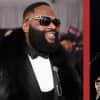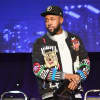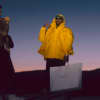The producer is one of the most crucial yet anonymous figures in all of music. Every other week, with Beat Construction, an extension of our column in the magazine, we aim to illuminate the role producers are playing in creating some of our favorite music. For the latest installment we talk to Atlanta's Mike Will, who was still just a teenager when he was contributing to Gucci Mane's mixtape hot streak. He later found chart success with Meek Mill's anthemic "Tupac Back," spent some time in the studio with Justin Bieber and showed a more sensitive side recently with a trio of ballads on Future's Pluto.
What was your upbringing like? I came up in Marietta, GA. I'm the youngest of three, got two older sisters. My sisters made me go hard. One was a drum major in the Olympics and the other always stood out on the athletic side. She got front page of the sports [section] for softball. So one sister was in the Olympics, the other sister was on the front page, I had to be the shit too! They both graduated college so when I graduated high school my pops was hard on me about going to college. I went to Georgia State for a couple of years and then I dropped out. I was making good grades—I dropped out with a 3.1—but that just wasn't my forte. I was still doing music.
I'd leave school and I'd be in the studio with all the other kids' favorite rappers. I'd be leaving the studio and on my way to school and hear all the kids playing the music like, Yo! Did you hear the new Gucci Mane tape?! I told my pops, "Man this college shit cool but I think I got my plan together." If you don't have a plan together, don't drop out. The semester I dropped out college was the same semester "Tupac Back" came out. I had a song on the Billboard charts so pops was like "Okay, I see what you doing." Before that I was working with 2 Chainz and Busta Rhymes with the "La La" record and me and Future blasted off that "Dirty Sprite." From there I didn't look back. I just pressed the gas with the relationships I had and the new sound that I had and I took off with it.
Did you grow up around a lot of music? You could say that, but I wasn't paying attention to it like I should've been. My mom was in a gospel group, she sang for Dottie Peoples when I was young, and my uncle was a beast with the guitar. He'd always try to teach me stuff when I showed an interest in the music but that's when the Lil Jon [style] was popping and all you needed was three notes and you had a banger. I was on my three note shit when he was trying to teach me to be musical. But I kinda had a natural talent. I'd pencil tap in the school cafeteria and I would always hear stuff from the radio and play it back [on] this little broke Casio keyboard that my sister had from when she was a little kid. The batteries used to be falling out the back so I'd have to put tape on it and push it down on my leg. The first song I'd do was the Big Tymers' ["Still Fly"], I'd replay that and my homeboy would freestyle to it. That was our favorite song. And whatever song we'd hear I'd just try to replay it, get a melody from the beat.
How did you progress from those Casio beats to getting more serious about production? I went to the local music store, Mars Music, and they had the MPC 1000. I asked them to show me how to use it and I made a beat, I took that little Fabolous "Holla Back," played that over and made into like a Southern No Limit-sounding beat. Everybody in there was like, "How long you been making beats?" and I was like "Man, I ain't never made no beats." But that's when I knew I really had to do it. I told my pops, "I think I want to start making beats." He was like, "making beats?!" At this point I had already given up baseball and football so all I had was basketball and he was like, You're gonna start making beats and you're gonna give up basketball. Then you're gonna make beats for a little while and give up making beats. But he bought me a beat machine, a Korg ES1, and I taught myself the basics. Then I graduated to the [Korg] Triton. Then I got the MP and the [Yamaha] Motif. Then I got the [Roland] Fantom.
When did you meet Gucci? I met Gucci when I was 16 and started working with him when I was 17. My homeboy had worked at Patchwerk studios and I'd go down there and let him hear my beats. One day Gucci was in the studio so I told my homeboy I had to go to the bathroom, went up stairs, ran into Gucci and I gave him a beat CD. He checked the beats out, he freestyled on them and we exchanged numbers. We talked on the phone but we [eventually] fell out of contact. He switched phones and I think he had gotten locked up around the same time [Later on] me and Waka met each other. I didn't even know that he knew Gucci, and he didn't know that I knew Gucci. Once I let him know that I knew Gucci he was like "Gucci's my cousin!" I showed him the numbers I had on Gucci, he knew I wasn't lying and we stayed in contact. Me and Waka talked on the phone every day. Waka was one of my biggest supporters off the rip. Before he even heard a snare a clap or a hi-hat, he'd run around telling everybody "This nigga Mike Will's beats is hard as fuck! Ain't nobody fucking with him!" When Gucci got out [Waka] was like "I got somebody that wants to talk to you." He put Gucci on the phone and Gucci was like "We gotta get in the studio, woo woo."
We knocked out twenty joints in three days, which lead to No Pad, No Pencil. I'd tell everybody in high school that me and Gucci [were working together] and they were just like, Yeah, yeah alright. They kinda played it off. That was in '07, the year I graduated. That summer all those joints came out and he was saying my name in his verse and shit like that. Then people were like, Yo!
What was Gucci's process like back then? Just like it is now. Crazy. Nobody works like him. Twenty songs in three days, dog! And a lot of that was just freestyles. "Load up the next one, Mike Will… load up the next one, Mike Will. Alright, I'm gonna listen to it in the lounge." Boom, going in. And those shits became hood classics. Gucci is a movie, he's one of a kind. Even if he picks up a pen, he just writes everything down [immediately], he doesn't even stop. It's like he already knows the song. Then he walks in the booth. As long as he likes the drop he's gonna go crazy on it. I've never seen anything like it, I've never seen anybody knock out so many songs so fast.
Was that intimidating? Nah. I already had a bunch of beats because I already had a lot of beats stashed up. I started making beats at 14 and this was age 17 and I used to make like four a day. So I was ready to go. If we needed anything on the spot back then, I was ready to do it.
When you make beats now do you just make them as they come or do you have it in your head you're gonna make a specific one for Gucci or Future or whoever? I don't say I'm gonna make a beat for anybody. I'm gonna make a beat that's harder than the last. How different can it get? How out the box can I go on this beat? How can I smoke the last beat? How can I make the bass hit harder? How can I make it so that when I play it people will say, Oh my goodness? So now it takes a couple days to knock them out. Once the record gets done I pretty much have an idea of who I'm taking it to and what style would work on the beat.
Tell me a little bit about your songs on Future's Pluto. That seems like a new direction for both you and him. When me and Future get in we try to kill whatever we just did last. The first track we did [for the album] was "Truth Gonna Hurt You," at the time he was working on a project called Future Hendrix. That beat was like two or three years old. I was going through my beats one day and heard it. I was listening to it and I was like, Future would be crazy on here, but he gonna have to paint a picture. So I brought it to the studio, he went straight in and knocked it out. The next record we did was "Turn On The Lights." We were in the studio and I was going through street shit at first and we were coming up with the dopest records. I was playing dope ass beats and he was coming up with dope ass hooks, but he never did lay any of them down. So I was like "we can do this kind of shit in our sleep, this street shit. I'm about to test you real quick." I played the "Turn On The Lights" beat and out of nowhere he was like [sings] "Turn On The Lights!" We knocked that joint out. Then we did "Neva End" the same night.
Did you know those beats were going to be for Future when you made them? I took "Neva End" to a couple R&B artists, I felt like [that] would've been a crazy dope track for an artist like Usher or even Rihanna. It has extra pop melodies but it's got a hood ass knock. But I'm not on their radar all the way right now and I couldn't take that beat to another rapper. Another rap nigga is gonna need a nigga to sing on the hook, he's not gonna do the whole song on his own. And he's probably gonna be like, That's too slow, I don't want no shit like that. Future doesn't have any boundaries. We can go in the studio, roll the dice and come up with a great record.
Do you think people are ready for him to push a ballad as a single? They're gonna have to get ready for it. I think he should show his talent, it's time for him to expand while he's hot. [He came] up as Second Generation Dungeon Family, Rico Wade being his cousin, watching the greats. You never knew what the fuck Outkast was gonna do next! You never knew what the fuck Goodie Mob was gonna do next! Who the hell would've thought after hearing ["Cell Therapy"] that Cee-Lo Green would be doing all the crazy songs that he's doing right now? I feel like Future should carry on that legacy. You don't know how he gonna sound. He might sound like a Jamaican, he might sound like a killer, he might sound like he's high as hell. That's how he should keep bringing it. You should never put yourself in any kind of box, even as a producer. People don't even know that I got fucking four on the floor music, I've got fist pumping shit. I'm experimenting with dubstep right now. Some producers are just gonna keep making the same beat over and over with just a different pattern but acknowledging those different genres is what makes a producer great.
What else are you working on at the moment? We just wrapped up a joint for Brandy's album, I worked with Sean Garrett on it. I did a crazy joint with Jeremih called "773-Love." I did one on B.O.B.'s record, I sent some joints to Rick Ross. I've been working with 2 Chainz on his album, [he] just did a record on one of my tracks with a big feature that I can't really speak on yet. "Way Too Gone" is about to be Jeezy's next single. I'm working with Ludacris on his album, we just did a crossover record and now we're working on some more urban records. I'm working on my project as well, Est. In 1989 Pt. 2. I'm just hoping that this one comes out doper than the last one. I'm just trying to build and grow and keep coming with dope music.


